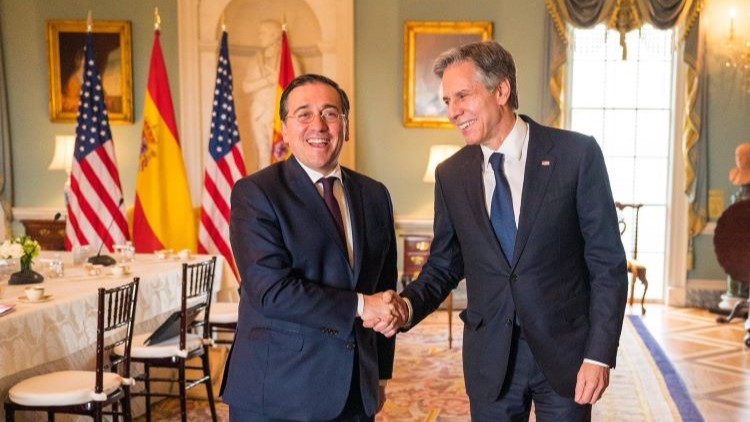Eduardo González
The US Secretary of State, Tony Blinken, assured yesterday, in Washington at the joint press conference with the Minister of Foreign Affairs, José Manuel Albares, that the US will resume negotiations with Spain for the removal of the land contaminated with plutonium from Palomares (Almería).
The negotiations “will resume soon,” Blinken declared. “We recognize the importance of the problem,” he added. Last March, the Ministry of Foreign Affairs submitted to the United States “the official request” to proceed with the removal of 50 tons of contaminated soil for transfer to the Nevada desert, in compliance with the non-binding commitment agreed by both countries in 2015 in this regard.
Government sources indicated yesterday the Palomares issue will be addressed tomorrow during the bilateral meeting at the White House between the President of the Government, Pedro Sánchez, and the President of the United States, Joe Biden, although they did not specify whether an agreement will be reached between the two leaders on this dispute, which began 57 years ago with the nuclear accident of two U.S. planes while flying over Spain.
At the same press conference, Albares declared that “the US is a good friend” with whom “we share values and interests, such as the fight against climate change, the preservation of the environment, the defense of democracy and human rights”. “We defend them at the international level in NATO or in the G-20. These are the foundations on which our relationship is based, to move forward in this framework towards the future,” he added.
“This bilateral relationship has numerous links: businesses, universities or our languages,” he continued. “Today at the meeting we have discussed many areas of collaboration. Our cooperation in defense, the agreement on migration to promote a humane Latin American migration, the Palomares sands, which will be removed, and also the scientific cooperation agreement to continue promoting the agreement with NASA,” he explained. Likewise, the Minister reiterated Spain’s commitment to Ukraine: “Support will be maintained until peace returns to its borders and it recovers its sovereignty. Transatlantic unity is key, especially at this time”.
Sánchez and Biden
Albares was received yesterday in Washington by Blinken in the prelude to the bilateral meeting between Sánchez and Biden at the White House, in which, according to government sources, the head of the Spanish Executive will discuss with the U.S. leader his recent conversations with the presidents of China and Brazil, Xi Jinping and Luiz Inácio Lula da Silva respectively, in which both presented him with their proposals to end the war in Ukraine.
According to the aforementioned sources, Ukraine will occupy a very prominent place in the interview between the two leaders. In this context, Sanchez will share impressions with Biden on his recent contacts with Xi and Lula, while conveying to the U.S. president the importance of listening to the opinions of third countries of the so-called Global South, which have been strongly impacted by the economic, financial and energy consequences of the war.
On March 31, Sanchez was received in Beijing by Xi Jinping, making him the first Western leader to visit Beijing since the meeting in Moscow between the Chinese leader and Russian President Vladimir Putin, and thus the first to personally address with Xi (by any means) Beijing’s twelve-point proposal to end the conflict in Ukraine (which calls for a ceasefire, an end to sanctions against Russia and respect for Ukraine’s territorial integrity). In Beijing, Sanchez asked Xi Jinping, to “hold a conversation” with the President of Ukraine, Volodimir Zelenski, to “learn first-hand about the Ukrainian government’s peace plan”, and admitted that China’s “positioning document” contains “some points that are very important”.
During the meeting with Lula, which took place on April 26 in Madrid, Sanchez welcomed the Brazilian president’s proposal to create a “G20 of peace” in Ukraine, but with “nuances”: “There is an aggressor and an aggressed and if we want a just and lasting peace it is essential that the voice of the aggressed country be heard”.
The White House has criticized Xi’s peace plan and warned, in the words of National Security Advisor Jake Sullivan, that Russia and China have become “inseparable allies.” Likewise, the White House accused the Brazilian president of “automatically repeating Russia’s propaganda without looking at the facts.” In response to these accusations, Lula himself assured that his government “condemns the violation of Ukraine’s territorial integrity” while defending “a political negotiation for the conflict”.
At the international and multilateral level, Sánchez will also discuss with Biden the “shared concern” between the two countries about the attacks on democracy and human rights by populism or disinformation campaigns, the climate emergency and digital transformation and migration management, an issue in which Spain and the US have increased their collaboration with other American countries, such as Canada, Mexico and Colombia. The priorities of the Spanish Presidency of the EU will also be addressed, including open strategic autonomy and relations between Europe and Latin America.
At the bilateral level, the two leaders will address various issues, such as the trade dispute over Spanish black olives, cooperation in security and defense (following the recent signing of the agreement to send two new US destroyers to the Rota naval base in Cadiz), scientific and technological cooperation (the announcement of a space cooperation agreement is expected, in which the recently created Spanish Space Agency will play a prominent role), the climate emergency and investment and trade (the US is the leading investor in Spain and the leading destination for Spanish investments).
Prior to his meeting with Blinken, Albares urged the United States and the European Union to become “much more” involved in Latin America because “if there is a region in the world” that shares the same values in favor of multilateralism and against war as a method of dispute resolution “it is Latin America”.







